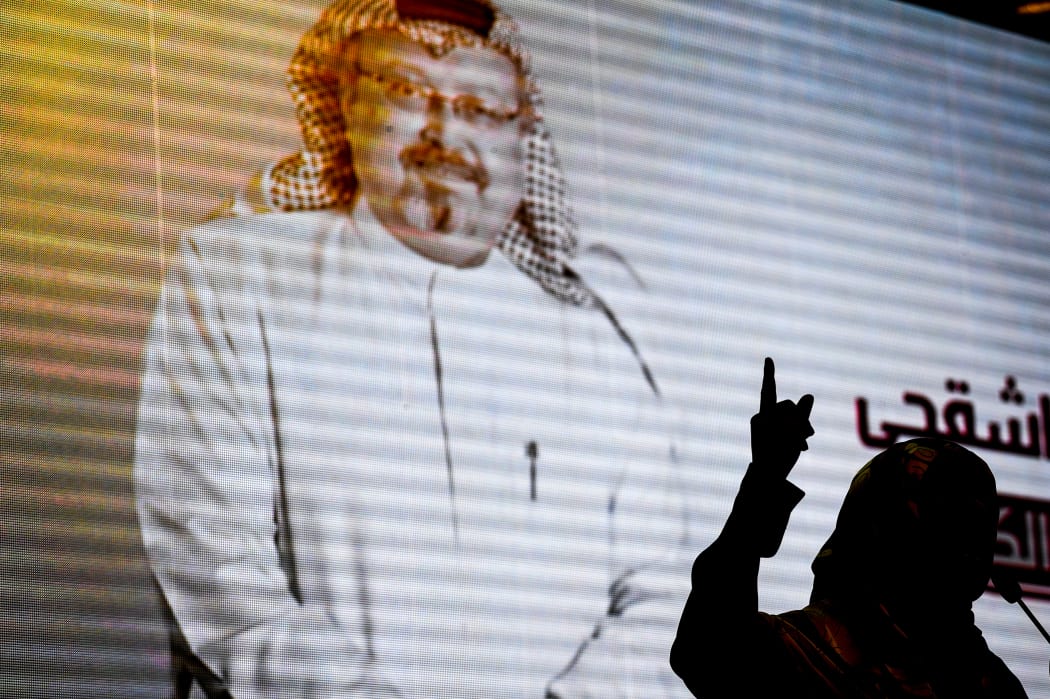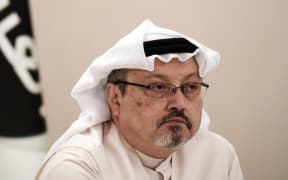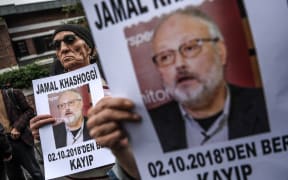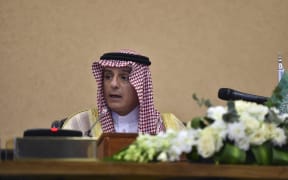Saudi Arabia "seriously curtailed and undermined" Turkey's ability to investigate the murder of Saudi journalist Jamal Khashoggi, a United Nations expert says.

A digital image of Jamal Khashoggi at a commemoration event of Khashoggi's supporters. Photo: AFP
The preliminary report into the investigation has concluded the 59-year-old was the victim of a brutal and premeditated killing, planned and perpetrated by Saudi officials.
It said Turkey was not allowed into the consul where the journalist was killed, for 13 days.
Khashoggi was last seen alive entering the Saudi consulate in Istanbul on 2 October.
The 59-year-old was a prominent critic of Crown Prince Mohammed bin Salman.
US officials have reportedly said such an operation would have needed the prince's approval.
But Saudi officials insist he was murdered by a "rogue" team of Saudi agents not acting on Prince Mohammed's orders.
The country has put 11 people on trial for the murder and is seeking the death penalty for five of them.
Saudi Arabia has refused to extradite its citizens to Turkey after the country issued arrest warrants for several Saudi officials.
What does the report say?
UN Special Rapporteur Agnes Callamard, who is leading an international human rights inquiry into the murder, visited Turkey between 28 January and 3 February.
The preliminary report on the inquiry said Khashoggi "was the victim of a brutal and premeditated killing, planned and perpetrated by officials of the State of Saudi Arabia".
Turkey's ability to investigate this murder though was "seriously curtailed and undermined by Saudi Arabia's unwillingness, for some 13 days, to allow Turkish investigators access to the crime scenes."
While the murder took place on 2 October, authorities only got access to the consulate on 15 October, and not to the residence there until 17 October - which in particular affected the forensic investigation, she wrote.
Ms Callamard also attacked Saudi Arabia's trial of 11 suspects in the case, saying it raises "major concerns" about transparency and fairness.
"I have requested an official country visit to Saudi Arabia so that the authorities there can directly provide me with relevant evidence," she wrote.
The fact Khashoggi's body still has not been found is causing "even greater suffering" to his loved ones, the report adds.
The final report will be presented to the UN human rights council in June.
What's the latest in the Khashoggi case?
Saudi Deputy Public Prosecutor Shalaan bin Rajih Shalaan said investigators had concluded an intelligence officer ordered Khashoggi's murder, applying a lethal injection inside the consulate.
The officer had been tasked with persuading the dissident journalist to return to the Gulf kingdom, he added.
Khashoggi's body was dismembered inside the building and the body parts were then handed over to a local "collaborator" outside the grounds, according to Mr Shalaan.
At the recent World Economic Forum in Davos, Saudi finance minister Mohammed Al-Jadaan told delegates the country was "absolutely sad about what happened to Jamal Khashoggi".
Turkey meanwhile has identified 15 men it believes to be Saudi agents arriving at and departing from Istanbul's international airport around the time of the killing.
It is unknown if any are now on trial in Riyadh.
The US has imposed sanctions on 17 Saudi officials, including Saud al-Qahtani, a former adviser to the crown prince who it alleged was "part of the planning and execution of the operation" that led to Khashoggi's murder.
It is unclear if any of the 17 are on trial.
- BBC




